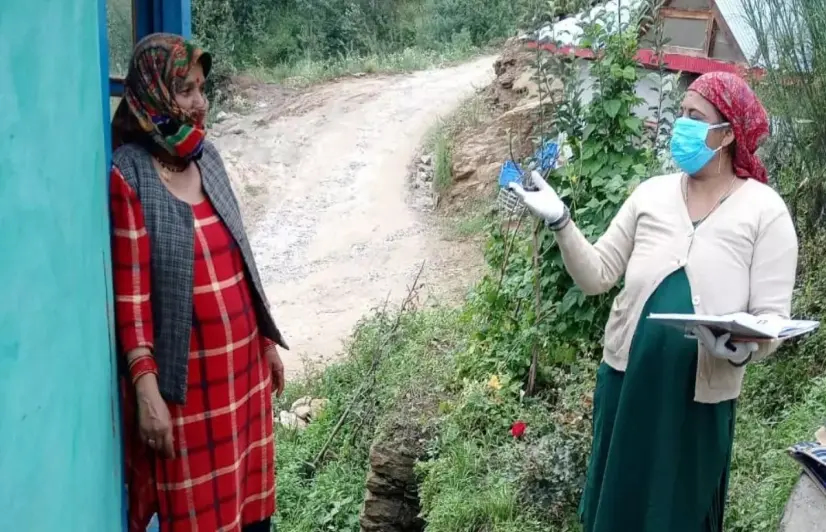ASHA workers in Himachal protest against exploitation, apathy

ASHA workers in Himachal protest against exploitation, apathy
ASHA workers engaged in remote villages have been asking the government to fix minimum wages and compensate them for overtime.
Shimla: Dejected by the government’s indifference to their plight, more than 7,500 Accredited Social Health Activists, or ASHA workers, in Himachal Pradesh had decided to gherao the state Assembly early in August. They said they were disappointed that, despite all their contributions in the fight against the spread of COVID-19 in more than 20,000 villages across the state, the government was doing nothing to compensate them for the risks they were taking or improve their financial situation.
While the current assembly session passed without incident, the workers are continuing their fight off-stage.
ASHA workers play a major role in the implementation of health schemes launched by both Central as well as state governments. In the countryside, they are known as Asha Didis and ever since the pandemic began, they have been the public face of the government's efforts to contain the spread in rural areas.
More work for a pittance
Kanta Devi,
an ASHA worker in the remote village of Bharmour, said that their tasks before the onset of
the pandemic was administering medicines to tuberculosis patients, maintaining
records of children’s vaccination and providing support to pregnant women –
giving them health advice and vitamin supplements as well as ensuring that they
are taken to the hospital for delivery.
However, after COVID-19 started spreading, the government assigned ASHA workers a number of additional tasks. Among them was the screening of around 150 recovered patients each day for post-covid tuberculosis. The ASHA workers have to ask each of them around 20 pre-set questions and upload the data on the health department’s app. For this additional work, they were being paid only 100 rupees per day, said Kanta Devi. This is not even sufficient to meet their travel expenses for the field visits, according to many ASHA workers.
She said that the villages were located far from each other and because of poor or
lack of internet connectivity, the ASHA workers often had to record the data on paper and upload it on the app later. She said if they failed to upload the
data before 4 pm, they would lose the payment for that day. Because of this, many of them were forced to take
the help of their family members to meet the target, she added.
According to the data of the National Rural Health Mission (NHRM), India had 10,31,751 ASHA workers in 2018. At that time, even though the Central government had fixed a monthly honorarium of Rs 2,000, they would get only Rs 1500 in hand. In March this year, Chief Minister Jai Ram Thakur announced an additional monthly incentive of Rs 750 for each ASHA worker in the state, but this is yet to reach them.
Rita, another ASHA worker from Bharmour, said that the authorities in the tribal district of Lahaul-Spiti were prompt in assigning them the task of persuading the rural folks there to take the COVID-19 vaccinations, but never considered that their salaries had been pending for up to three months. She said that because of the lack of public transport in those areas, she had to travel on foot wearing two masks and carrying a bottle of hand sanitiser to meet the people, leaving her two-year-old child back home. The government was not taking note of these struggles of ASHA workers, Rita added.
An Asha Didi at work (Picture courtesy of ASHA workers association)
Kirti Negi, an ASHA worker in
Kinnaur district, said uploading the health data using the app was a challenge
because of poor internet connectivity. Sometimes, it required several attempts and they were forced to work overtime to complete
the task. However, they were never paid for this, she said, adding that the
government must come out with a transparent policy for the welfare of ASHA
workers.
Usha Thakur, an office-bearer at an ASHA workers’ association, said the government was yet to fix working hours for these women who were struggling to take care of their responsibilities at home. She also said that the ASHA workers were grossly underpaid considering the amount of work they were doing and the risks they were taking by working in conditions that were making them vulnerable to coronavirus as well as tuberculosis infections.
State president of the association, Satya Ranta, pointed out the fact that there was only one ASHA worker for every five villages was enough to highlight the workload on them. She said the government was exploiting these workers at the time of a pandemic. He demanded that the government come out with a concrete policy for their welfare and fix a reasonable minimum wage. She said the association continues to be in talks with the administration and MLAs. They were also seeking a second meeting with the CM. Should these talks fail, they won't hesitate to go on strike, she said.
(Top) The ASHA workers union addresses the press in Shimla; (bottom) The union leaders with the Chief Minister (Pictures courtesy of ASHA workers association)
A strike will have a significant impact on the health services in the state, with pregnant women and TB patients adversely affected. With the third wave looming, the government’s plans to detect fresh infections as well as treat and monitor the health of quarantined COVID-19 patients in the villages will suffer without the ASHA workers.
Would you like to Support us
101 Stories Around The Web
Explore All NewsAbout the Reporter
Write For 101Reporters
Would you like to Support us
Follow Us On


